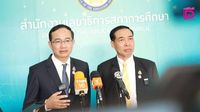On March 26, 2025, a significant announcement regarding literacy rates in Thailand was made by Dr. Praivit Eravarorn, Permanent Secretary of the Ministry of Higher Education, Science, Research and Innovation, alongside Mr. Thanagorn Donnuea, Director of the Office of Non-Formal and Informal Education. The press conference, held at the Ministry's headquarters, unveiled the results of a comprehensive survey conducted to assess the literacy levels of the Thai population in the year 2568 BE (Buddhist Era).
The survey, which was a collaborative effort between the Ministry and the Department of Non-Formal and Informal Education, involved a meticulous process of sampling across the nation. It encompassed 7,429 sub-districts, representing a total of 225,963 households, and accounted for a population sample of 533,024 individuals. The findings revealed a strikingly low illiteracy rate of just 1.17% among those aged 15 years and older, and 1.16% among individuals aged 7 years and older.
Dr. Praivit noted that literacy is a crucial indicator reflecting the quality and accessibility of education within a country. He stated, "The literacy rate serves as a significant benchmark for evaluating educational systems globally, and it is a key metric used in international rankings of educational performance." This survey's results not only highlight Thailand's advancements in literacy but also position the nation favorably compared to its ASEAN neighbors, particularly in light of data compiled from 2022.
When examining the provincial breakdown, the survey indicated that 51 provinces had an illiteracy rate of less than 1%, while 25 provinces fell within the 1-5% range. Notably, only one province reported an illiteracy rate exceeding 10%. These statistics suggest that Thailand is on track to potentially rank first in literacy within the region, surpassing countries like Malaysia and Singapore.
However, the survey also brought to light several concerning trends. Dr. Praivit pointed out that there is a growing issue of "literacy decline" among certain demographics, particularly older adults and the unemployed, who are increasingly showing signs of reduced reading skills. This decline poses a silent threat to the overall literacy quality among the Thai population.
Among the key factors identified that contribute to increased literacy rates were the pressing need for employment, especially in industrial zones. Dr. Praivit emphasized the importance of addressing these employment-related motivations as a means of further enhancing literacy among the populace.
Additionally, the survey findings highlighted disparities in literacy quality linked to the size of educational institutions. It was noted that the gap between smaller and larger schools significantly impacts students' literacy outcomes, a factor that should not be overlooked in future educational policies.
To combat these challenges and improve literacy rates further, a series of policy recommendations were proposed. Dr. Praivit suggested creating initiatives that promote "Active Ageing" through participatory literacy programs, which could enhance health, life stability, and overall quality of life for the elderly population. He stated, "Engaging older adults in literacy activities can lead to better health outcomes and a more fulfilling life experience."
Moreover, it was recommended that literacy promotion efforts be tailored to the interests and needs of specific target groups, encouraging creative reading activities. The integration of artificial intelligence (AI) in educational practices was also proposed as a means to make learning more engaging and effective for all age groups.
In addition, the survey emphasized the importance of providing job opportunities for the unemployed as a mechanism to stimulate personal development and enhance reading skills. Dr. Praivit remarked, "Employment not only supports economic stability but also fosters an environment conducive to learning and skill development."
The results of this literacy survey are expected to play a pivotal role in shaping educational strategies and policies in Thailand. They will provide valuable insights for analyzing and synthesizing educational development, contributing to the formulation of comprehensive educational plans and strategies aimed at elevating the country's educational competitiveness.
Furthermore, discussions with UNESCO regarding the implications of these findings have already commenced, with the intention of utilizing this contemporary data to accurately reflect the quality of Thai education on an international scale. The hope is that this data will not only enhance Thailand's educational standing but also ensure that the nation continues to progress towards achieving high literacy levels across all demographics.
In conclusion, while the survey results are promising, they also underscore the need for ongoing efforts to address literacy challenges and ensure that all segments of the Thai population have the opportunity to develop and maintain their reading skills. The commitment to fostering a literate society remains a priority for the Thai government, as it recognizes the vital role literacy plays in personal and national development.





